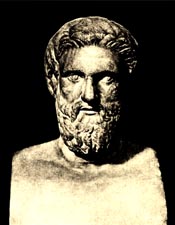Knights
, translated by Theodoridis, G., (contributor-contact-email)
The Knights by Aristophanes, written in 424 BC, is a notable example of Old Comedy, critiquing the political and social milieu of 5th-century BC Athens during the Peloponnesian War. The play is distinctive for its focused cast, primarily centred around a caricature of Cleon, a populist leader known for his pro-war stance. Aristophanes, previously targeted by Cleon for his play The Babylonians, uses The Knights as a form of satirical revenge.
The plot revolves around a character named Agoracritus, a sausage seller, who competes with Cleon for the trust and approval of Demos, an embodiment of the Athenian people. Through a series of challenges, Agoracritus triumphs over Cleon, symbolically restoring Demos to a state of dignity and prosperity. This victory serves as a metaphor for the hoped-for renewal of Athenian society. The play’s portrayal of Cleon as Paphlagonian adds an element of allegory, illustrating the wider impact of political actions on society. The Knights combines satire with political commentary, reflecting Aristophanes’ skill in using comedy to critique contemporary Athenian politics.

Theodoridis, G.,
Support Open-Access:
Your contribution keeps our classical translations available to all. Every dollar helps support classics education and funds the expansion of our catalogue. Value what we do? Donate now.
File Downloads:
© Copyright, All Rights Reserved. This work may be freely reproduced, stored and transmitted, electronically or otherwise, for any non-commercial purpose. Conditions and Exceptions apply.